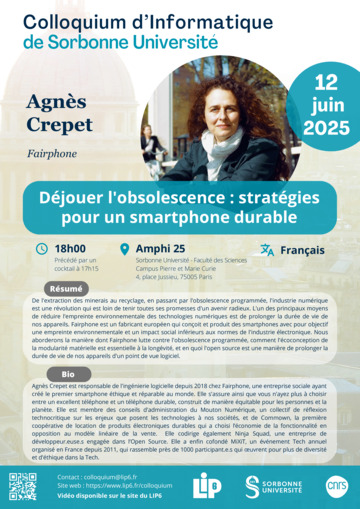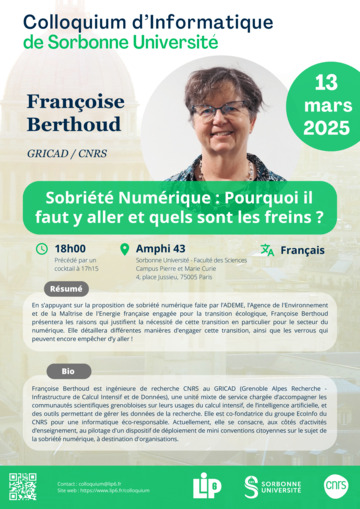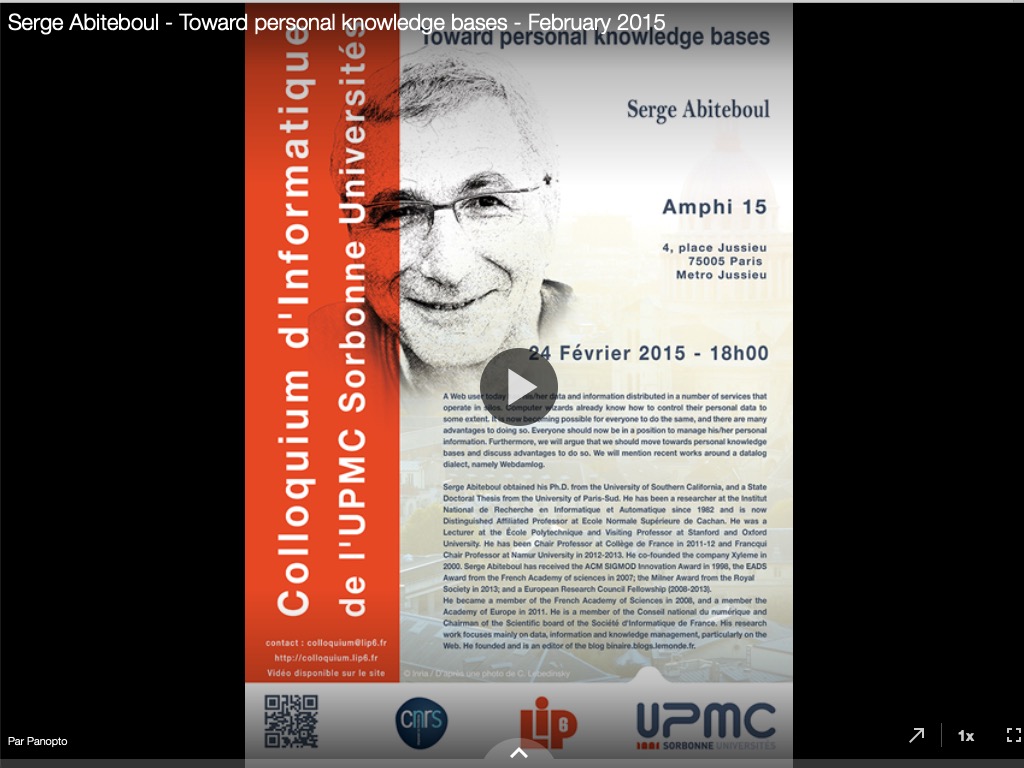Colloquium d’Informatique de Sorbonne Université
Serge Abiteboul, Inria
Toward personal knowledge bases
Serge Abiteboul obtained his Ph.D. from the University of Southern California, and a State Doctoral Thesis from the University of Paris-Sud. He has been a researcher at the Institut National de Recherche en Informatique et Automatique since 1982 and is now Distinguished Affiliated Professor at Ecole Normale Supérieure de Cachan. He was a Lecturer at the École Polytechnique and Visiting Professor at Stanford and Oxford University. He has been Chair Professor at Collège de France in 2011-12 and Francqui Chair Professor at Namur University in 2012-2013. He co-founded the company Xyleme in 2000. Serge Abiteboul has received the ACM SIGMOD Innovation Award in 1998, the EADS Award from the French Academy of sciences in 2007; the Milner Award from the Royal Society in 2013; and a European Research Council Fellowship (2008-2013). He became a member of the French Academy of Sciences in 2008, and a member the Academy of Europe in 2011. He is a member of the Conseil national du numérique and Chairman of the Scientific board of the Société d'Informatique de France. His research work focuses mainly on data, information and knowledge management, particularly on the Web. He founded and is an editor of the blog binaire.blogs.lemonde.fr..
A Web user today has his/her data and information distributed in a number of services that operate in silos. Computer wizards already know how to control their personal data to some extent. It is now becoming possible for everyone to do the same, and there are many advantages to doing so. Everyone should now be in a position to manage his/her personal information. Furthermore, we will argue that we should move towards personal knowledge bases and discuss advantages to do so. We will mention recent works around a datalog dialect, namely Webdamlog.
About
Launched in 2012, the Colloquium d’Informatique de Sorbonne Université is a recurring event that invites major figures of the computer science field to give special lectures on the campus of Sorbonne University’s Science and Engineering Faculty. It targets a diverse yet technically-informed audience, and especially computer science researchers from all specialities, PhD students, and computer science students at master level.
The Colloquium’s main event is the invited speaker’s lecture, a 45-minute talk followed by questions and interactions with the audience. Generally, this lecture is associated with a masterclass reserved for PhD students from LIP6 and/or other labs.
As the main driving force behind to the steering committee, LIP6 oversees the Colloquium’s organisation, with occasional support from ISIR.
Steering committee
- Jean-Claude Bajard
- Marcin Detyniecki
- Binh-Minh Bui-Xuan
- Bertrand Granado
- Mathieu Jaume
- Nicolas Maudet
- Marc Shapiro
- Fabien Tarissan
- Gaël Thomas
Contact: Gaël Thomas
Colloquium announcements
If you do not want to be informed anymore, you can unsubscribe to colloquium announcements
- Year 2025 – 2026
- Year 2024 – 2025
-
 Agnès Crepet
Agnès Crepet
June 12, 2025
Déjouer l'obsolescence : stratégies pour un smartphone durable -
 Françoise Berthoud
Françoise Berthoud
March 13, 2025
Sobriété Numérique : Pourquoi il faut y aller et quels sont les freins ? -
 Sandrine Blazy
Sandrine Blazy
November 26, 2024
Compilation vérifiée : vers du logiciel zéro défaut -
 Hans Bodlaender
Hans Bodlaender
October 10, 2024
Parameterized Algorithms and Complexity Classes
-
- Year 2023 – 2024
-
 Maurice Herlihy
Maurice Herlihy
June 25, 2024
Further Decentralizing Decentralized Finance -
 Jean-Marc Jézéquel
Jean-Marc Jézéquel
April 04, 2024
Comment dompter la variabilité du logiciel ? -
 Claire Mathieu
Claire Mathieu
January 24, 2024
Vehicle routing and approximation algorithms -
 David Bol
David Bol
November 21, 2023
Six of the nine planetary boundaries are transgressed – How we do research in the Anthropocene?
-
- Year 2022 – 2023
- Year 2021 – 2022
- Year 2020 – 2021
- Year 2019 – 2020
- Year 2018 – 2019
-
 Cláudio T. Silva
Cláudio T. Silva
June 11, 2019
Urban Data Science -
 Sébastiano Vigna
Sébastiano Vigna
May 06, 2019
Four degrees of separation (and how we did it) -
 Hugo Gimbert
Hugo Gimbert
March 19, 2019
Les algorithmes de Parcoursup -
 Julie Grollier
Julie Grollier
February 05, 2019
Nanodevices for Bio-inspired Computing -
 Jacques Pitrat
Jacques Pitrat
November 20, 2018
L'IA forte -
 James Larus
James Larus
October 23, 2018
Programming Non-Volatile Memory
-
- Year 2017 – 2018
-
 Eric Horvitz
Eric Horvitz
June 20, 2018
AI Aspirations and Advances -
 Justine Cassell
Justine Cassell
May 15, 2018
Designing Bots, Virtual Humans, and Other Systems that Can Hold up Their End of the Conversation -
 Léon Bottou
Léon Bottou
March 06, 2018
Une approche géométrique de l'apprentissage non supervisé -
 Jean-Luc Schwartz
Jean-Luc Schwartz
January 16, 2018
Modélisation cognitive des unités de la parole -
 Timothy Roscoe
Timothy Roscoe
November 30, 2017
The Trouble with Hardware
-
- Year 2016 – 2017
-
 Simon Peyton Jones
Simon Peyton Jones
May 23, 2017
Escape from the ivory tower: the Haskell journey -
 Maria Chudnovsky
Maria Chudnovsky
April 25, 2017
Induced subgraphs and coloring -
 Philippa Gardner
Philippa Gardner
March 28, 2017
Understanding and Verifying JavaScript Programs -
 Michel Beaudoin-Lafon
Michel Beaudoin-Lafon
February 28, 2017
Interfaces Homme-Machine -
 Marie-Paule Cani
Marie-Paule Cani
November 22, 2016
Modélisation 3D expressive -
 Richard Stallman
Richard Stallman
October 11, 2016
What Makes Digital Inclusion Good Or Bad? -
 Patrick Cousot
Patrick Cousot
September 29, 2016
Abstract interpretation
-
- Year 2015 – 2016
-
 Patrick Flandrin
Patrick Flandrin
June 16, 2016
« Chirps » everywhere -
 Aude Billard
Aude Billard
April 12, 2016
Robots that exceed human capabilities -
 Willy Zwaenepoel
Willy Zwaenepoel
March 22, 2016
Really Big Data -
 Jon Crowcroft
Jon Crowcroft
January 19, 2016
Cybersecurity and network measurement -
 Isabelle Collet
Isabelle Collet
November 24, 2015
Les informaticiennes, de la dominance de classe aux discriminations de sexe -
 Xavier Leroy
Xavier Leroy
October 20, 2015
Desperately seeking software perfection
-
- Year 2014 – 2015
-
 Silvio Micali
Silvio Micali
May 26, 2015
Proofs, Secrets, and Computation -
 Alessandra Carbone
Alessandra Carbone
April 14, 2015
The new era of biology is computational -
 Serge Abiteboul
Serge Abiteboul
February 24, 2015
Toward personal knowledge bases -
 Manuel Silva
Manuel Silva
November 25, 2014
Fluidization of discrete event models or a marriage between the discrete and the continuous -
 Andrew S. Tanenbaum
Andrew S. Tanenbaum
October 28, 2014
MINIX 3: A Reliable and Secure Operating System
-
- Year 2013 – 2014
-
 Donald Knuth
Donald Knuth
June 17, 2014
Computer Science: All Questions Answered -
 Jeannette Wing
Jeannette Wing
May 20, 2014
Toward a Theory of Trust in Networks of Humans and Computers -
 David Patterson
David Patterson
May 06, 2014
Myths about MOOCs and Software Engineering Education -
 Claude Berrou
Claude Berrou
March 25, 2014
L'information mentale -
 Vint Cerf
Vint Cerf
March 04, 2014
On the Preservation of Digital Information -
 C.A.R. (Tony) Hoare
C.A.R. (Tony) Hoare
November 26, 2013
Laws of concurrent system design -
 Gilles Dowek
Gilles Dowek
October 22, 2013
Are formal methods the future of air traffic control?
(Is there an autopilot on board?)
-
- Year 2012 – 2013
-
 Mathieu Feuillet, Camille Couprie, Mathilde Noual
Mathieu Feuillet, Camille Couprie, Mathilde Noual
June 25, 2013
Espoirs : Winners of the 2012 Gilles Kahn prize -
 Robert Sedgwick
Robert Sedgwick
May 23, 2013
Taking Education Online: A Unique Opportunity for the New Millenium -
 Frans Kaashoek
Frans Kaashoek
April 18, 2013
The multicore evolution and operating systems -
 Stuart Russell
Stuart Russell
January 22, 2013
Unifying logic and probability: A “New Dawn” for Artificial Intelligence? -
 Georges Gonthier
Georges Gonthier
November 27, 2012
Le génie mathématique, du théorème des quatre couleurs à la classification des groupes -
 Gérard Berry
Gérard Berry
October 24, 2012
Le temps et les événements en informatique
-
- Year 2011 – 2012













